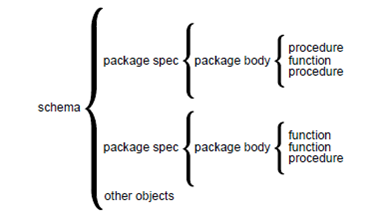The Package Specification
The package specifications contain the public declarations. The scopes of these declarations are local to your database representation and global to the package. Therefore, the declared items are available from your application and from anyplace in the package. The figure describes the scoping.

Figure: Package Scope
The specification lists the package resources accessible to the applications. All the information that your application require to use the resources is in the specification. For illustration, the declaration below shows that the function named the fac takes one argument of the type INTEGER and returns a value of type INTEGER:
FUNCTION fac (n INTEGER) RETURN INTEGER; -- returns n!
That is all the information you require to call the function. You do not require to consider its underlying implementation (whether it is recursive or iterative for illustration). The subprograms and cursors only have an underlying implementation or definition. Therefore, if a specification declares only the constants, types, variables, exceptions, and call specifications, the package body is unessential. Consider the bodiless package which is as shown below:
-- a bodiless package
CREATE PACKAGE trans_data AS
TYPE TimeRec IS RECORD (
minutes SMALLINT,
hours SMALLINT);
TYPE TransRec IS RECORD (
category VARCHAR2,
account INTEGER,
amount REAL,
time_of TimeRec);
minimum_balance CONSTANT REAL := 10.00;
number_processed INTEGER;
insufficient_funds EXCEPTION;
END trans_data;
The package trans_data requires no body as the constants, types, variables, and the exceptions do not have an underlying implementation. These packages define the global variables-usable by the subprograms and database triggers-that persist throughout a session.